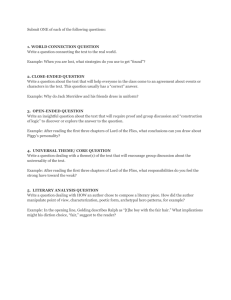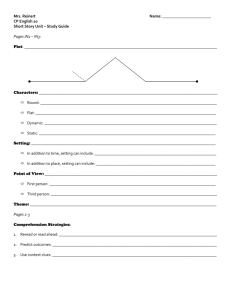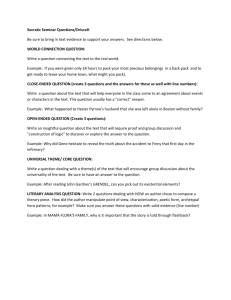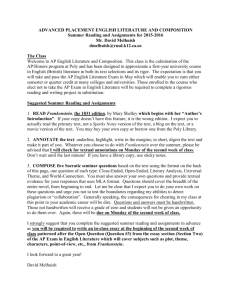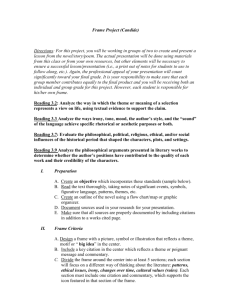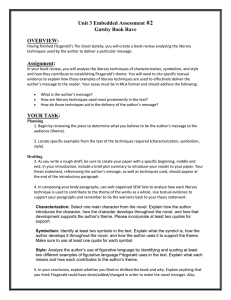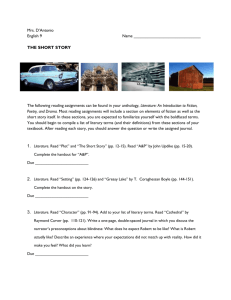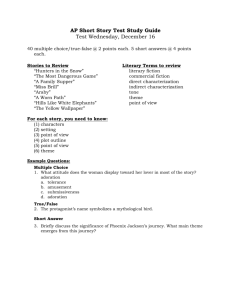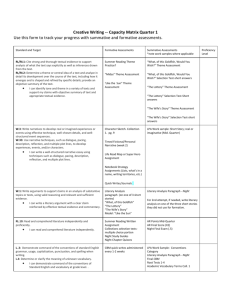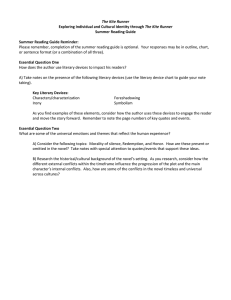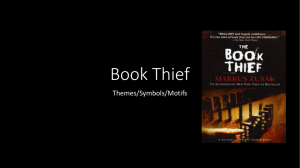Honors World Literature and Composition
advertisement
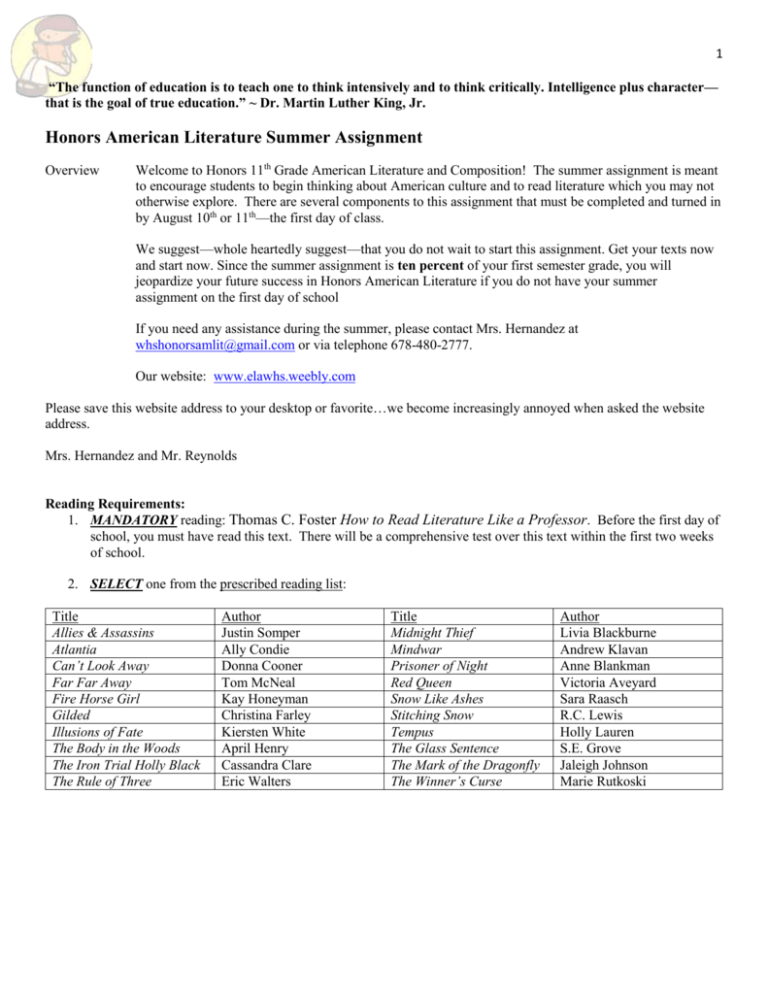
1 “The function of education is to teach one to think intensively and to think critically. Intelligence plus character— that is the goal of true education.” ~ Dr. Martin Luther King, Jr. Honors American Literature Summer Assignment Overview Welcome to Honors 11th Grade American Literature and Composition! The summer assignment is meant to encourage students to begin thinking about American culture and to read literature which you may not otherwise explore. There are several components to this assignment that must be completed and turned in by August 10th or 11th—the first day of class. We suggest—whole heartedly suggest—that you do not wait to start this assignment. Get your texts now and start now. Since the summer assignment is ten percent of your first semester grade, you will jeopardize your future success in Honors American Literature if you do not have your summer assignment on the first day of school If you need any assistance during the summer, please contact Mrs. Hernandez at whshonorsamlit@gmail.com or via telephone 678-480-2777. Our website: www.elawhs.weebly.com Please save this website address to your desktop or favorite…we become increasingly annoyed when asked the website address. Mrs. Hernandez and Mr. Reynolds Reading Requirements: 1. MANDATORY reading: Thomas C. Foster How to Read Literature Like a Professor. Before the first day of school, you must have read this text. There will be a comprehensive test over this text within the first two weeks of school. 2. SELECT one from the prescribed reading list: Title Allies & Assassins Atlantia Can’t Look Away Far Far Away Fire Horse Girl Gilded Illusions of Fate The Body in the Woods The Iron Trial Holly Black The Rule of Three Author Justin Somper Ally Condie Donna Cooner Tom McNeal Kay Honeyman Christina Farley Kiersten White April Henry Cassandra Clare Eric Walters Title Midnight Thief Mindwar Prisoner of Night Red Queen Snow Like Ashes Stitching Snow Tempus The Glass Sentence The Mark of the Dragonfly The Winner’s Curse Author Livia Blackburne Andrew Klavan Anne Blankman Victoria Aveyard Sara Raasch R.C. Lewis Holly Lauren S.E. Grove Jaleigh Johnson Marie Rutkoski 2 3. ANNOTATE your chosen text. Please give yourselves time to read the books in order to take thorough notes. Please take notes on major literary devices and major points used IN the novels themselves. Below are your note-taking guidelines: This means that during that first week of class, you will be expected to provide: anything written in the margins of your text (i.e., statements, questions, words), items circled, underlined, highlighted, etc.—you should be interacting with the text at all times! While there is no one way to annotate a text, here is a useful guideline (feel free to create your own system): a. Circle symbols b. Bracket examples of motifs c. Underline examples of themes d. Squiggly-line major characters/descriptions e. Write questions of comprehension in the margins f. Write questions of further confusion at the end of each chapter that later will have my answers g. Write brief summaries of my thoughts on what happened at the end of each chapter h. Make notations of patterns seen i. Highlight in 1 color important terms (definitions/explanations will be found at the top/bottom of the page) j. Highlight in another color solid examples of figurative language and write brief explanations in the margins next to it (i.e., similes, metaphors, personification, euphemism, foreshadowing, alliteration, anaphora, etc.) You may not find examples of everything in every text. k. Highlight in another color examples of rhetorical devices (i.e., allusions, foils, paradoxes, irony, hyperboles, ethos, pathos, logos, allegories, parallelism, tone, etc.) You may not find examples of everything in every text. Regardless of your system, there should be several examples of each of the above findings. News Article Requirement: It is important that students are familiar with what is currently happening in America and the world as this will be useful when writing argumentative essays, an essay format that is widely utilized throughout the rest of your high school career. Therefore you will complete the following: 1. COLLECT five news articles that can be connected to your chosen novel in some way. These articles must be from reputable sites (CNN, NY Times, Chicago Times, newspapers from other countries). 2. PRINT out a copy of the news articles and type a response to each one that includes the following information: a. A paraphrase of the events discussed in the article in your own words. b. Make a connection to America, yourself, or how the events discussed could affect America. c. What surprises you about the information in the article? d. Make a connection to your chosen novel with a minimum of 2 textual examples and citations from both readings. Follow the CEI Model (Claim, Evidence, Interpretation). Seminar 1. COMPOSE five (5) Socratic seminar questions based on the text using the format you will find at the end of this packet, one question of each type: Close-Ended, Open-Ended, Literary Analysis, Thematic, and WorldConnection. You must also answer your own questions and provide at least 2 pieces of textual evidence for each of your responses, following MLA format. Questions cover the breadth of the entire novel from beginning to end (divide the novel in half). 3 Tips for Socratic Seminar Questions 1. CLOSE-ENDED QUESTION: A question which deals with matters of character, setting, and plot and which has one correct answer that is stated explicitly in the text. a. Example: What happened to Hester Prynne’s husband so that she was left alone in Boston without a family? 2. OPEN-ENDED QUESTION: A question that is arguable, has no “correct” answer, lends itself to discussion and debate, and whose answer requires textual support and proof as one interprets multiple meanings inherent in a text. a. Example: Why did Gene hesitate to reveal the truth about Finny’s accident that first day in the infirmary after the mid-point of A Separate Peace? 3. LITERARY ANALYSIS QUESTION: A question dealing with HOW and WHY an author composes a literary piece in terms of point of view, characterization, theme, archetypal hero-patterns, etc. a. Example: Why is it important that the narrator of Invisible Man is left nameless? b. Example: What is the theme of Invisible Man? 4. UNIVERSAL THEME/CORE QUESTION: A question which widens out the implications of “theme” as it might apply to Question #3 in an attempt to make connections with universal experience. a. So, while a literary analysis question in relationship to theme in Frankenstein might be: “What point is Mary Shelley trying to make about the forces that made the Creature monstrous?” A Universal Theme/Core Question that expands on that would be: Example: To what degree do the influences that either Nature or Nurture have on our behavior excuse us from taking moral responsibility for how we feel and act? 5. WORLD CONNECTION QUESTION: The “you” question that applies the thematic concerns of the work to the reader’s real-life situation. a. Example: After reading Night, if you were given only 24 hours to pack your most precious belongings in a backpack and get ready to leave your hometown, what would you pack?
